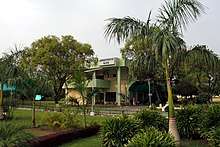Central University of Punjab
The Central University of Punjab is a Central University located in Bathinda, Punjab, India. It has been established through an Act of Parliament: "The Central Universities Act, 2009" by Govt. of India. The territorial jurisdiction of Central University of Punjab is whole of the State of Punjab.[2] Central University of Punjab has been ranked as number one amongst newly established central universities in India consistently since 2012 as per university rankings of Researchgate and Scopus.[3]
 | |
| Type | Central University |
|---|---|
| Established | 2009 |
| Chancellor | Sardara Singh Johal |
| Vice-Chancellor | R.K. Kohli |
| Location | , Punjab , 30°08′24″N 74°47′27″E |
| Campus | Rural, 500 acres (2 km²) |
| Nickname | Bathinda University |
| Affiliations | University Grants Commission; National Assessment and Accreditation Council; Association of Commonwealth Universities[1] |
| Website | cup.ac.in |
The Central Universities Bill 2009 aims at creating one new central university each in Bihar, Gujarat, Haryana, Himachal Pradesh, Jammu and Kashmir, Jharkhand, Karnataka, Kerala, Orissa, Punjab, Rajasthan and Tamil Nadu. It also seeks to convert Guru Ghasidas Vishwavidyalaya in Chhattisgarh, Harisingh Gour Vishwavidyalaya in Sagar (Madhya Pradesh) and Hemwati Nandan Bahuguna Garhwal University in Uttarakhand into Central universities.[4]
University Profile

The Central University of Punjab, Bathinda (Punjab) has been established through the Central Universities Act 2009 which received the assent of the President of India on 20 March 2009. Its territorial jurisdiction extends to the whole State of Punjab.
It started its functioning from Camp Office in April, 2009, which happens to be the residence of the Vice Chancellor, and from November 2009 it shifted to its City Campus spread over an area of 35 acres. The main campus is coming up on more than 500 acres of land in Ghuda Village (21.5 km from Bathinda Bus Stand) on Bathinda-Badal Road.
Academics
The university offers mainly research oriented master's and doctoral degree programmes: Ph.D., M.Phil., M.Sc., M.A., M.Pharm., M.Tech., LL.M., M.Ed, and post-graduat diploma programmes.[5]
Schools and centres
- School of Basic and Applied Sciences: Centre for Animal Sciences, Centre for Applied Agriculture, Centre for Biochemistry and Microbial Sciences, Centre for Chemical Sciences, Centre for Computational Sciences, Centre for Mathematics and Statistics, Centre for Pharmaceutical Sciences and Natural Products, Centre for Physical Sciences, Centre for Plant Sciences.
- School of Education: Centre for Education.
- School of Engineering & Technology: Centre for Computer Science and Technology.
- School of Environment and Earth Sciences: Centre for Environmental Sciences and Technology, Centre for Geography & Geology
- School of Global Relations: Centre for South and Central Asian Studies (including historical Studies).
- School of Health Sciences: Centre for Human Genetics and Molecular Medicine.
- School of Languages, Literature and Culture: Centre for Comparative Literature, Centre for Classical and Modern Languages.
- School of Legal Studies and Governance: Centre for Law.
- School of Social Studies: Centre for Economic Studies, Centre for Sociology.
Accreditation and ranking
Rankings
| University rankings | |
|---|---|
| General – India | |
| NIRF (Universities) (2020)[6] | 87 |
In the young age of seven year of establishment University has proved itself with NAAC 'A' Grade.
Central University of Punjab ranked 87th among universities by National Institutional Ranking Framework (NIRF) in 2020.[6]
Research contributions
University has best research contribution among all the newly established Central Universities with the SCOPUS (h-index:13 citation index: 575), RG Score (1387.56) and Research Gate Impact Point (400.9).
Researchers from this university had contributed in a number of peer-reviewed scientific research. Among these are discovery of new species of marine alga Ulva paschima and Cladophora goensis, first report of endophytic algae from Indian Ocean, discovery of the geographical origin of Holy Basil as North-Central India, Molecular assessment of Hypnea valentiae-a red alga from West and East coast of India and multitargetted molecular docking analysis of plant-derived natural compounds against PI3K Pathway.
Notable People
- 1. Prof. R. K Kohli, Vice chancellor & Eminent Ecologist
2. Prof. Paramjeet, Department of Botany 3. Prof. V. K. Garg, Environmental Sciences 4. Prof. RamaKrishana Wusirika, Plant Biochemistry 5. Prof. Anjana Munshi, Dean Research 6. Prof. Santosh Kumar Mahapatra, Department of Physics 7. Prof. Pabitra Kumar Misra, Dean of Social Sciences 7. Prof Amandeep Kaur, Dean of Engineering and Technology 8. Prof. Alpana Saini, Deppartment of English 9. Prof Tarun Arora, Department of Law 10. Prof Rajesh Kumar, Department of Chemistry
References
- "Association of Commonwealth Universities Membars-Asia". Retrieved 16 January 2019.
- http://www.prsindia.org/uploads/media/vikas_doc/docs/1241592408~~1235040259_central_University_Bill_2009.pdf
- "Central University Punjab ranked among top universities of India - Times of India".
- "Parliament passes bill to set 12 central varsities". The Times of India. 25 February 2009. Retrieved 21 March 2012.
- "Admission notification:2011-2012". projects.eduquity.com. Archived from the original on 3 September 2011. Retrieved 26 August 2011.
- "National Institutional Ranking Framework 2020 (Universities)". National Institutional Ranking Framework. Ministry of Human Resource Development. 11 June 2020.
External links
| Wikimedia Commons has media related to Central University of Punjab. |